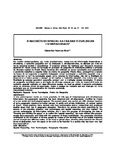O raciocínio espacial na era das tecnologias informacionais
Resumo
In the contemporary world, or, more precisely, in this age of instantaneous and simultaneous
information, the geographic reasoning has been detached and, simultaneously, modified by means
of a new social and technological aspects. The present study was carried out with nineteen teachers
of some geography teachers-formation courses, in public and private institutions, of various regions
of Brazil. These teachers have worked with new technologies and/or researched and produced
studies about their use in geography education. Therefore, we pursue the study searching for the
answer of the following question: new technologies and spatial reasoning: are they related? The
current technologies, as information vehicles, don´t have the purpose of developing the idea of
“knowing and thinking the space” or to realize the “spatial reasoning”, but even without this purpose,
people learn geography and think with the presence of these technologies. The geography education
contributed to the formation of diverse people by means of the development of the spatial reasoning
carried through two different scales, of the local to global place, showing joints between the diverse
levels of abstraction, from the space of the work to its insertion in a society that has been very fast
internationalized.
KEY WORDS:
Spatial Reasoning; New Technologies; Geography Education.




